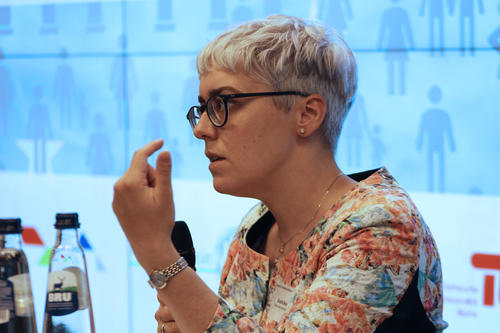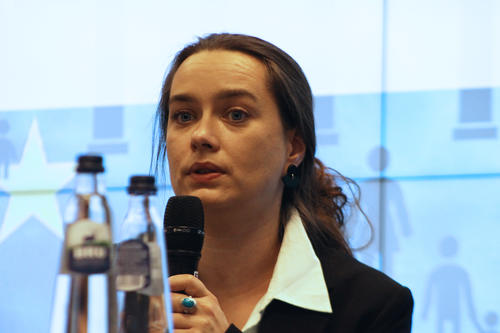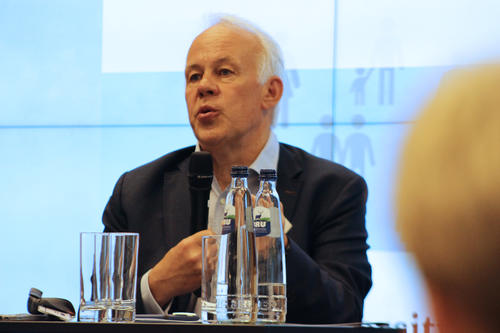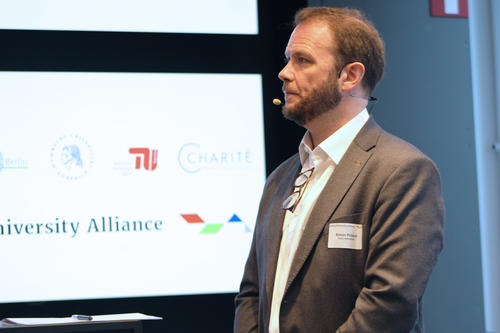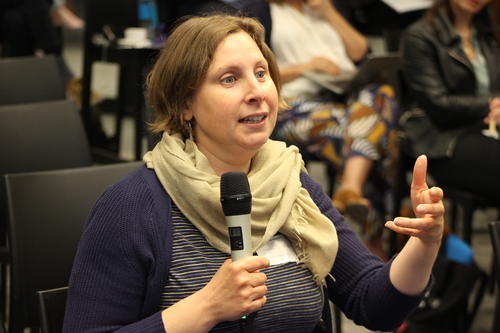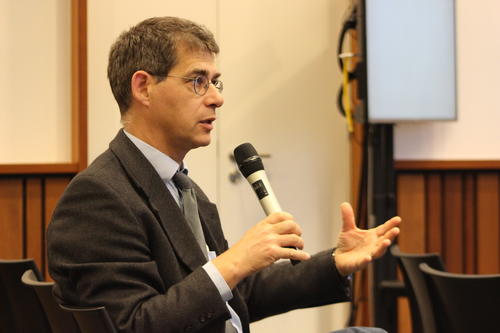Open Forum IV: Mission critical: Is Horizon Europe ready to accommodate transdisciplinary science?
Für einen kurzen Einblick, haben wir einige Punkte aus der Diskussion herausgegriffen. Wenn Ihr Interesse geweckt ist, schauen Sie sich gern die Aufzeichnung der Veranstaltung an, um tiefer in das Thema einzutauchen.
For a brief insight, we have picked out a few points from the discussion. If your interest is piqued, feel free to watch the recording of the event to dive deeper into the topic.
- Prof. Dr. Sophia Becker, Vice President and Head of the Department of Sustainable Mobility and Transdisciplinary Research Methods, Technische Universität Berlin
- Mr. Neville Reeve, Common Policy Center, European Commission, DG RTD
- Dr. Mandy Singer-Brodowski, Institut Futur, Freie Universität Berlin
... the most important defining element of transdisciplinarity is that it's a process to include non-academic actors into research processes. So it's all about process design, a systematic approach to interact with stakeholders, let's say nonacademic stakeholders, for example, policymakers, industry or civil society, administration actors, also lobbying groups. ...
…I think it's even a big challenge for the academic system because transdisciplinarity means interacting with stakeholders, even if you're not paid to do this. And sometimes even it has some - downsides or pitfalls. Because … as a transdisciplinary scientist or researcher, you're somehow moving out of the academic system. If you're doing that, you're leaving the ivory tower for some time or even forever. Sometimes it's hard to find your way back when you have started to closely interact with stakeholders. …
…But …the benefits are that when you co-design the solutions and co-create solutions, then there are higher chances that the solutions, the good ideas, will actually get implemented one day and that you don't only fill hundreds of pages of paper…
…[e.g.] we ask the actors, “do we have some kind of blind spots?” … this is the kind of knowledge that is really important for transdisciplinary research processes, because then we create more robustknowledge…
…I would totally agree that transdisciplinary research is a process perspective of co-design, co-creation, co-evaluation of research processes, and therefore coming to the perspective of what it needs to be implemented. …
…We need time and space not only for the academics but also for the practitioners…
….the missions respond almost precisely to the issues which have been flagged up there. .. it's not just an instrument, the missions, it's about a process. …
…The missions are rooted in research and innovation, but they're much more than research and innovation. …
…we hope very much that that role of the citizen will be current throughout the life of the mission. …
…at some point you need to write the criteria for funding to be allocated to the portfolios of actions around the missions…How do we apply our transdisciplinary thinking to the role and the value of society and citizens in this process without just saying you have to demonstrate in your applications that you will engage with citizens? Because we are constrained by Horizon Europe criteria, the evaluation criteria. Are they too rigid for transdisciplinary approaches? …
…Because there's one thing we didn't talk about yet: It's trust. When you work together with nonacademic actors, you have to build up a trustful relationship with them, otherwise it won't work. …
…in the beginning, you often have to persuade them … that they have to spend some of … their spare timeto discuss with you … to share their knowledge with us… it's also important … that there are at least little reimbursements…
… when we think about how to evaluate transdisciplinary work, there are already approaches out there…
…in the end, it's a form of, I would say, discursive power that you want researchers to have or to develop in a transdisciplinary project. And there are ways to assess this, just as you can assess your scientific discursive power by H-factor, being cited, number of publications and so on. …
… what we, I think urgently need is the training of emerging researchers in terms of transdisciplinary research approaches ... we urgently need to think about how we can prepare the future generation of emerging researchers to integrate, to mediate between different worlds within science, within academia, but also between the world of academia and the outside world…
Dr. Vinciane Gaillard, Deputy Director for Research and Innovation, European University Association
Bildquelle: Science|Business Publishing
…so it's going out of your own box or your own circle, and this is not easy to see what is in there for you, short term at the very least….
… well, it's about the recognition of the different roles in research. It's about also recognizing the contribution of nonacademic actors to the process. And with this, you said compensating for the time, possibly even to giving them an official position in the association. I can already hear some researchers say, well, this is well, again, money that will be taken out of the core research...
Dr. Klaus Jacob, Environmental Policy Research Centre, Freie Universität Berlin
Bildquelle: Science|Business Publishing
…to come back briefly on the criteria to assess impact of transdisciplinarity and you said it's about discursive power … you said earlier, that it's also about developing ownership, and if I own something, I don't refer anymore to the professor who did co-design something … I present [it] as my own idea…[A] possible conclusion could be not to look at outputs and impacts but on the quality of the process…
… if we really take inclusion of societal actors seriously, then we have to ask who is included. …the participants who are taking part … are highly academic, educated…they are the same people everywhere. So there are a lot of people excluded… we should ensure more social cohesion, also in the European research context. Then we should be courageous to give this funding to the NGOs who are, for example, struggling for more inclusion on a societal level or for nature, environmental protection or something like that…
… Coming back to this question of is the money missing then for research? I would say yes in a way that would be the result. … But when I look at the situation in Germany… we have a lot of capacity for problem solving in the researchers’ world, but not enough in the world of practice, especially in policy and administration. So out there, there are no people to implement my good ideas that I have developed. And so I think, this might sound weird that I argue here for less money for research and more money for societal problem solving. …
…But I do think that … as scientists, we can have a sort of catalytic role. …it means that scientists can have the role to mediate between different societal groups, and that means sometimes sharing power. …
…But I think that especially mission oriented research … really makes no sense if we don't have the societal capacities on … the non academic side. … I wouldn't say that this is the same case for basic research, but that's not the panel today. So just to limit this a little bit, this is not my general view on every kind of research. …
… when we went to setting up work programs with expected impact statements, then you introduce … the challenge of how do you evaluate against the proposal, its credibility about something which may happen substantially in the future.
It's about how they understand the path towards those impacts …And there's been a lot of work to improve on that…
…. how you evaluate missions…, First of all, if you are dealing with something which potentially… is much longer term than traditionally the … actions we'd be funding, you need a different approach there, you need to be able to potentially change direction…you need to have that flexibility, reflexivity, and that's one of the areas of work which we're involved with at the moment. …
… you have to understand about the experimental nature of the missions aspect. … it's not saying at the outset we are absolutely certain about “these are the things we need to do.” We believe these things are right. So you have to build in that sort of experimental quality into the way in which you evaluate. …
…Now we have an evaluation of the missions [themselves], which will take place just next year in 2023, … We can't actually identify precisely what's coming out of this so far. But nonetheless, are those ingredients you're putting together the correct ones? … missions should be something where you would expect to be regularly and perhaps more regularly scrutinized than other areas of work. …
… it is an essential task of the University of the 21st Century to offer training for emerging researchers to tackle grand challenges and problems … wicked sustainability problems: They are complex, they have many contradicting perspectives in it. And young researchers have to deal with it and have to understand which different disciplines they need to tackle this problem, which different practical perspectives they could include…
… it's important to make a difference between PhD students and postdocs, because the TD Academy, they are targeting postdoc researchers and I think that's a good idea actually. …
… my own PhD students, I do not invite to do a transdisciplinary PhD, because I think the current academic system, it doesn't fit a transdisciplinary PhD. …
… Transdisciplinarity is something that you might get started a little bit during the PhD phase, but it's better in a postdoc or later phase and it makes sense because the PhD often is grounded in disciplinary work. … I think that we have to adapt the training to the scientific career of the researchers. …
… if we accept that there's a good fit, quite a natural fit behind mission oriented or mission driven research policy and objectives and the modalities and the potential impacts of transdisciplinary science, how do we connect those two to get more of it for mission oriented research? Is this something that … comes bottom up out of the scientific approach? Or does it need to be led by policy institutions like the Commission… Who decides and who drives mission oriented research? ..
… at the moment there is a great deal to learn because there's a huge amount of work taking place on this. It is a hot topic, so to speak. One of the areas of work we're going to do is to support mutual learning on missions, approaches, taking some prominent examples, certainly in terms of governance and sharing those around.
We are visiting currently Member States … running a one day, two day program … bringing together all of the relevant ministries and talking about the work which we're doing - and there's an enormous demand for this.
… it can be a combination of both… there is an abstract definition or a formulation of a general problem, …but then if as a Berlin researcher, I would apply for the scheme, I would wonder where are the regions in Germany where this is actually taking place? …So that could be a combination.
And then, of course, another question is what is the scientific debate on that topic? …try to match, like a triangle, the case study region, the scientific state of the art model, theory, [or] methodology and the funding scheme question.
References mentioned in the talks:


